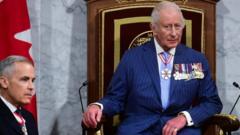
King Charles Addresses Canadian Parliament, Marking Historic Moment Amidst US Relations
A Royal First in Decades: The King's Speech and its Significance
In a historic moment for Canada, King Charles III delivered the Throne Speech to the Canadian Parliament, marking the first time a reigning monarch has done so since 1977. This significant event unfolded against a backdrop of intricate domestic challenges and, notably, evolving dynamics in Canada's relationship with its closest ally, the United States.
The Throne Speech, a crucial component of Canada's parliamentary process, outlines the government's agenda and priorities for the upcoming legislative session. It is traditionally read by the Governor-General, the King's representative in Canada. However, King Charles's personal delivery lent an unparalleled weight and symbolism to the occasion.
Key Priorities Outlined in the Throne Speech
The speech touched upon several critical areas of focus for the Canadian government:
- Economic Stability and Affordability: Addressing concerns about inflation and the rising cost of living, with proposed measures to support Canadian families and businesses.
- Climate Change and Environmental Sustainability: Reinforcing Canada's commitment to combating climate change through investments in renewable energy and sustainable infrastructure.
- Indigenous Reconciliation: Continuing efforts towards reconciliation with Indigenous communities, emphasizing self-determination and addressing historical injustices.
- Healthcare System Strengthening: Improving access to healthcare services and reducing wait times, a persistent challenge across the country.
- National Unity and Social Cohesion: Promoting inclusivity and diversity, while addressing regional disparities and fostering a sense of national identity.
US Relations: Navigating a Complex Landscape
The King's address coincided with a period of nuanced relations between Canada and the United States. While historically strong and deeply intertwined, recent years have seen certain points of friction emerge. Trade disputes, differing approaches to international policy, and varying perspectives on environmental regulations have contributed to a complex dynamic.
Specifically, the Throne Speech subtly addressed key areas of divergence:
- Trade and Tariffs: While emphasizing the importance of maintaining a robust trade relationship, the speech signaled Canada's intention to protect its domestic industries and pursue fair trade practices.
- Environmental Policy: Canada's commitment to ambitious climate targets, as articulated in the speech, potentially sets it apart from the US approach in certain areas.
- International Agreements: The speech highlighted Canada's commitment to multilateralism and international cooperation, suggesting a different emphasis than a more unilateral approach.
Reactions and Analysis
The Throne Speech has elicited a range of reactions from political analysts, business leaders, and the general public. Some have praised the government's focus on key priorities, while others have expressed concerns about the feasibility of implementing the proposed measures. The opposition parties have been vocal in their criticism, questioning the government's record and offering alternative policy proposals.
The speech also sparked considerable debate about the future of Canada-US relations. Some observers believe that the current challenges are temporary and that the fundamental strength of the relationship will prevail. Others argue that deeper structural issues need to be addressed to ensure a stable and mutually beneficial partnership.
Looking Ahead
As the Canadian Parliament embarks on its new session, the government will face the task of translating the priorities outlined in the Throne Speech into concrete policy actions. Navigating the complexities of domestic challenges and managing the evolving relationship with the United States will require careful diplomacy and strategic decision-making. King Charles' historic address has set the stage for a period of intense political activity and significant policy developments in Canada.
```